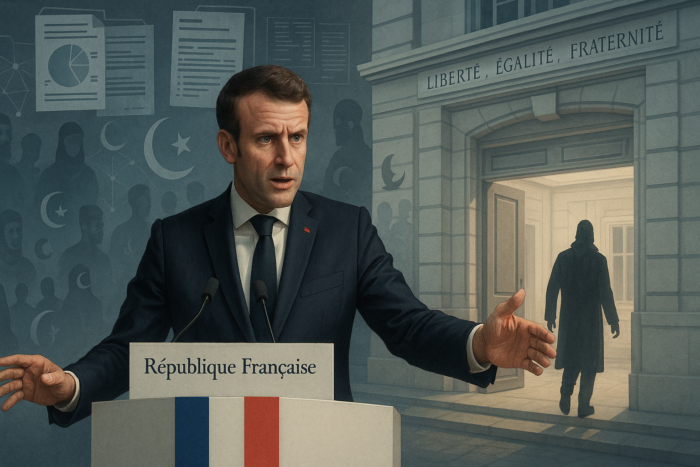The Macron administration has unveiled comprehensive financial and administrative measures to combat Islamist infiltration following a meeting of the National Defense and Security Council, which identified a “threat to national cohesion.” On 7 July 2025, France 24 reported that President Emmanuel Macron announced new sanctions tools targeting the development of Islamism “from below” by the Muslim Brotherhood organization, with legislation expected by year-end to strengthen existing counter-separatism measures. The article begins:
“More effective obstruction measures”: Emmanuel Macron announced the creation of new financial and administrative sanctions tools to better combat Islamist infiltration on Monday, July 7, following a meeting of the National Defense and Security Council. Regarding the legislative change that is required, the head of state called for a bill “by the end of the summer” and “which would be applicable by the end of the year.” Emmanuel Macron, who wanted to “put this “important subject” into perspective after a first Defence Council on May 21, detailed several measures adopted during this Defence Council convened after the publication, in May, of a report on the Muslim Brotherhood reporting a “threat to national cohesion” with the development of Islamism “from below”.
Key Points
- Macron announced new measures to freeze monetary and financial contributions, expanding existing terrorism-related financial restrictions to target Brotherhood funding networks
- Administrative dissolution powers will be expanded beyond legal entities to include endowment funds, with judicial courts appointing curators for asset liquidation
- The Defense Council imposed daily penalty payments for associations that signed the Republican Commitment Contract but fail to comply with its terms
- New legislation targeting Muslim Brotherhood entrism is expected by summer’s end, with full implementation planned before year-end, strengtheningthe counter-separatism framework
Global Muslim Brotherhood Operations and Influence in France
The Global Muslim Brotherhood has established a sophisticated operational framework in France, including a network of 139 mosques, 280 associations, and 21 schools under the Federation of Muslims of France (FMF), employing what French intelligence describes as “entryism” tactics to gradually influence local institutions and secular governance structures. This strategy has generated significant political controversy, particularly as far-right politicians face legal challenges for their accusations against Muslim organizations, while cross-border intelligence assessments reveal that neighboring countries identify similar pressure groups operating throughout Europe.
The movement’s influence extends beyond France’s borders, with European youth organizations facing criticism for their Brotherhood connections and actively challenging French government reports that document systematic infiltration attempts. French President Emmanuel Macron has responded to official warnings about this threat by implementing new financial sanctions and asset-freezing mechanisms. Meanwhile, the Brotherhood’s political strategy has evolved to include coordinated international campaigns and leveraging populist political movements to advance its agenda. The organization’s educational infrastructure has faced particular scrutiny, with legal challenges emerging over state partnerships and parliamentary tensions arising from Brotherhood-linked organizations’ involvement in official events, demonstrating the movement’s capacity to operate within democratic institutions while pursuing ideological transformation.
External References:
-
Muslim Brotherhood’s influence in France: What the controversial report reveals
-
Government-commissioned report says Muslim Brotherhood posing threat to French values
-
Macron moves to shut down suspected Muslim Brotherhood groups in France
- French report warns of spread of Muslim Brotherhood ideology
Disclaimer
The Global Influence Operations Report (GIOR) employs AI throughout the posting process, including generating summaries of news items, the introduction, key points, and often the “context” section. We recommend verifying all information before use. Additionally, images are AI-generated and intended solely for illustrative purposes. While they represent the events or individuals discussed, they should not be interpreted as real-world photography.









